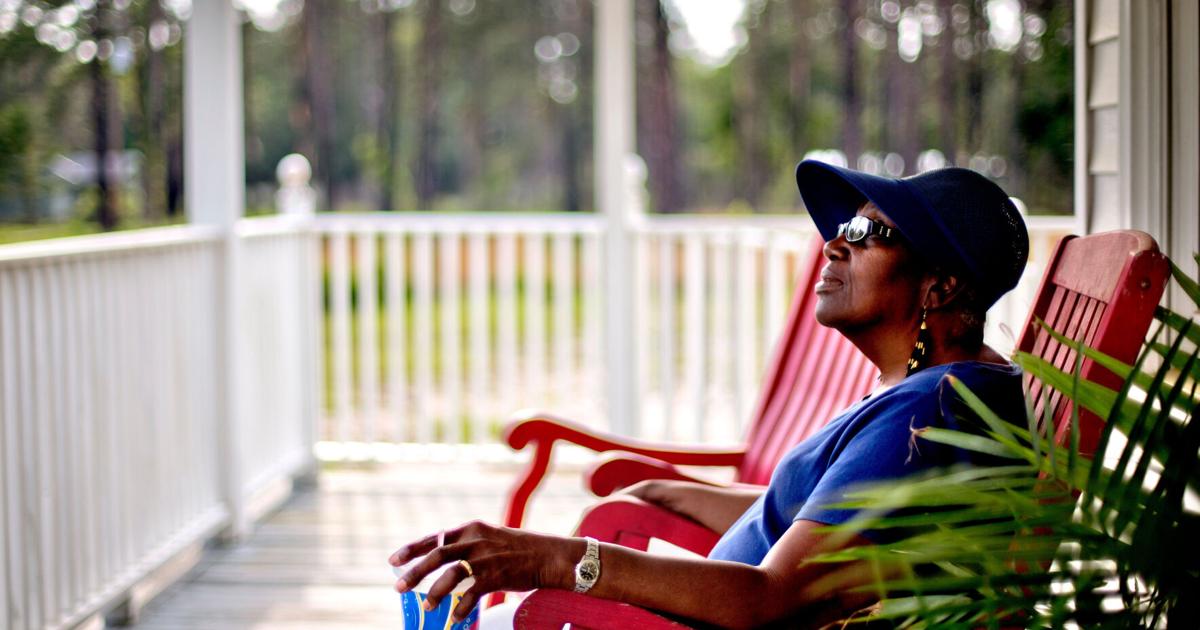FILE — Cornelia Bailey sits on the front porch of the Sapelo Island Cultural and Revitalization Society in the Hog Hammock community of Sapelo Island, Ga., on Thursday, May 16, 2013. (AP Photo/David Goldman, File)
FILE — The new Nathan Deal Judicial Center was dedicated to the former governor that bears its name on February 11, 2020, in Atlanta. (AP Photo/John Amis, File)
FILE — J.J. Wilson, 9, rides a school bus to catch a ferry to his school on the mainland from his home in the Hog Hammock community of Sapelo Island, Ga., on Wednesday, May 15, 2013. (AP Photo/David Goldman, File)
—
**ATLANTA —** Georgia’s highest court on Tuesday sided with Black landowners in a fight over zoning changes that weakened long-standing protections for one of the South’s last Gullah-Geechee communities founded by freed slaves.
The state Supreme Court unanimously reversed a lower court ruling that had stopped a referendum to consider repealing a revised zoning ordinance passed by McIntosh County officials two years ago.
Residents of Sapelo Island opposed the zoning amendments that doubled the size of homes allowed in a tiny enclave called Hog Hammock. Homeowners feared the change would result in one of the nation’s most historically and culturally unique Black communities facing unaffordable tax increases.
Last year, residents and their supporters submitted a petition with more than 2,300 signatures from registered voters seeking a referendum in the coastal county, which lies 60 miles (96 kilometers) south of Savannah.
However, McIntosh County commissioners sued to stop the referendum, and a lower court ruled that it would be illegal, halting the vote with less than a week to go before Election Day. Hundreds of people had already cast early ballots in the referendum.
On Tuesday, the high court found that the lower court was wrong to conclude that the zoning ordinance was not subject to referendum procedures provided for in the Georgia Constitution’s Home Rule Provision.
“Nothing in the text of the Zoning Provision in any way restricts a county electorate’s authority to seek repeal of a zoning ordinance,” Supreme Court Justice John Ellington wrote in the opinion.
“We feel vindicated,” said Jazz Watts, a Hog Hammock homeowner who helped organize the referendum effort. “The election should not have been stopped. It was stopping the voice of the people.”
It is not immediately clear when the referendum might be rescheduled. But attorney Dana Braun, who represents the Hog Hammock residents, said the ruling will give county residents “some real say” in whether they support the zoning change.
McIntosh County attorney Ken Jarrard expressed that the county commissioners are “obviously disappointed” by the order but respect the high court’s ruling. Jarrard had asserted during oral arguments at the Supreme Court in April that zoning powers are different from others entrusted to county governments by the state Constitution and, therefore, cannot be challenged by referendum.
Philip Thompson, an attorney representing the Hog Hammock residents, argued that they have a constitutional right to a referendum on the zoning changes so that they can defend a place that’s “a cultural and historical treasure.”
Approximately 30 to 50 Black residents live in Hog Hammock, a community of dirt roads and modest homes founded by their enslaved ancestors who worked the cotton plantation of Thomas Spalding. The community is among a dwindling number of small settlements started by emancipated island slaves—known collectively as Gullah, or Geechee, in Georgia—scattered along the coast from North Carolina to Florida.
Scholars say the island’s separation from the mainland allowed the communities to retain much of their African heritage, from their unique dialect to skills and crafts such as cast-net fishing and weaving baskets.
In 1996, Hog Hammock earned a place on the National Register of Historic Places, the official list of treasured U.S. historic sites.
Residents depend on the local government in McIntosh County, where 65% of the 11,100 residents are white, to maintain protections that preserve the community.
The state Supreme Court was not weighing whether Hog Hammock deserves special protections. Instead, the justices considered technical questions about whether local zoning laws can be challenged by referendum and whether McIntosh County commissioners had a right to sue to stop the vote last October.
—
*Stay informed and connected — subscribe to The Philadelphia Tribune NOW!*
—
**Comment Guidelines**
– Keep it Clean. Please avoid obscene, vulgar, lewd, racist, or sexually-oriented language.
– PLEASE TURN OFF YOUR CAPS LOCK.
– Don’t Threaten. Threats of harming another person will not be tolerated.
– Be Truthful. Don’t knowingly lie about anyone or anything.
– Be Nice. No racism, sexism, or any sort of -ism that is degrading to another person.
– Be Proactive. Use the ‘Report’ link on each comment to let us know of abusive posts.
– Share with Us. We’d love to hear eyewitness accounts, the history behind an article.
https://www.phillytrib.com/news/across_america/georgias-highest-court-sides-with-slave-descendants-fighting-to-protect-threatened-island-community/article_89423039-aec7-49c1-b0f1-8a21812a7292.html
